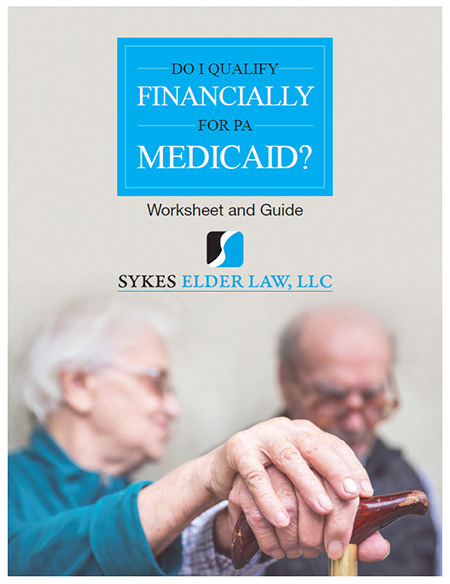To be eligible for Medicaid, an applicant can own only a modest amount of “resources.” But some resources are exempt, meaning they will be excluded when determining eligibility.
Exact rules vary from state to state. Here are Pennsylvania’s rules on the most common exempt resources:
Home, at least up to $500,000 in equity. Real property used as the principal place of residence by the applicant, a spouse, or dependent relatives is excluded, as long as the applicant, spouse or relatives live in the property. This exclusion also covers land and related outbuildings necessary to the operation of the home.
If the applicant is institutionalized, the residence will remain excluded if the applicant states in writing that his or her intention is to return to the residence. The statement can be provided by a person with authority to act on the applicant’s behalf, if the applicant is incapable of providing the information.
Under the Deficit Reduction Act (DRA), enacted February 8, 2006, the allowed value of an applicant’s equity interest in the home is capped at $500,000, unless the applicant’s spouse, child under age 21, or disabled child is lawfully residing in the home. States can opt to increase that amount to $750,000, but Pennsylvania has not done so. An applicant can use a reverse mortgage or home equity loan to reduce equity interest.
Household goods and personal effects. Household goods such as furnishings and equipment commonly found in a household are excluded. So are personal effects, including (but not limited to) clothing, jewelry, items of personal care, recreational equipment, musical instruments, and hobby items. Items required because of a person’s physical condition, such as prosthetic devices, dialysis machines, motorized wheelchairs, hospital beds, and similar items are excluded.
Motor vehicle. Pennsylvania regulations exclude only one motor vehicle for the applicant. If the applicant is married, the exclusion remains at one vehicle for the couple. Other motor vehicles are counted at their equity value.
Life insurance. Life insurance that does not accumulate a cash value, such as term insurance, is excluded. As to life insurance that does accumulate a cash value, Pennsylvania regulations exclude up to a maximum face value of $1,500 for each insured person. “If the life insurance of an insured person has a total face value in excess of $1,500, only the cash surrender value in excess of $1,000 shall be considered a resource to the owner.” 55 Pa. Code §178.69.
Burial spaces. An Operations Memorandum issued by the Department of Public Welfare in November 2003 provides that the value of all burial plots owned by Medicaid applicants will be excluded. The regulations specify that the burial space exclusion covers conventional gravesites, crypts, burial drawers, mausoleums, urns and similar repositories.
Irrevocable burial reserve. Burial reserves (also known as funeral reserves, funeral agreements, pre-paid funeral agreements, and burial funds) are excluded if they are deposited with a funeral director or financial institution under a written agreement providing that the funds cannot be withdrawn before the death of the named beneficiary.
The agreement may include such items and services as casket, cemetery plot, flowers, and obituary. Regulations exclude an amount that is not exorbitant. DPW may consider a reserve exorbitant if it exceeds average local costs by more than 25%. If the amount in the burial reserve exceeds this amount, the excess amount may be considered reasonable if the applicant can demonstrate that the amount is not exorbitant for the person’s situation, and that the higher amount is needed for such things as cost of transportation for the body, certain costs for a priest, minister or rabbi who is a close friend or relative, and a reasonable gift to a church or a synagogue for use of facilities for services. See, 55 Pa. Code §178.5(5)(ii).
Trade or business property essential to self-support. Real property or personal property is excluded if used in a trade or business, or by the recipient as an employee and is essential to self-support. These resources are excluded regardless of value.
Non-business property essential to self-support. Property not used in a trade or a business is excluded if it is: (1) used exclusively to produce items for home consumption (such as cows supplying milk, chickens supplying eggs, or a garden plot used for fruits or vegetables); and (2) tools, equipment, uniforms and similar items required by an employer.
Revocable burial reserve. If the burial reserve is revocable, an applicant may exclude up to $1,500, reduced by the cash value of certain life insurance policies. See, 55 Pa. Code §178.73(2).
Community spouse pension funds. IRA’s, 401(k)’s and other deferred compensation funds are excluded if owned by a “community” spouse — that is, the spouse of an applicant. See, 42 U.S.C. §1382b(a); 20 C.F.R. §416.120; 55 Pa. Code §§178.2, 178.5, and 178.61-178.84.
Other exclusions. Other, less common exclusions may also apply, including such items as disaster relief assistance, certain trusts containing assets of disabled individuals, and payments of the German or Japanese governments to certain Holocaust and World War II survivors. See generally, 42 U.S.C. §§1382b and 1396p(d)(4); 20 C.F.R. §416.1210; 55 Pa. Code §178.





